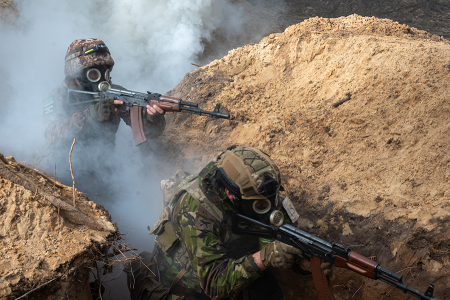"[Arms Control Today] has become indispensable! I think it is the combination of the critical period we are in and the quality of the product. I found myself reading the May issue from cover to cover."
U.S. Accuses Russia of Chemical Weapons Use in Ukraine
June 2024
By Mina Rozei
The United States has accused Russia of violating the international chemical weapons ban by using choking and riot control agents multiple times in its full-scale war against Ukraine and has imposed new sanctions as punishment.

In a May 1 statement, the U.S. State Department said that it had “made a determination…that Russia has used the chemical weapon chloropicrin against Ukrainian forces in violation of the Chemical Weapons Convention (CWC) [and]…has used riot control agents as a method of warfare in Ukraine, also in violation of the CWC.”
“The use of such chemicals is not an isolated incident and is probably driven by Russian forces’ desire to dislodge Ukrainian forces from fortified positions and achieve tactical gains on the battlefield,” the department added.
But on May 7, the Technical Secretariat of the Organisation for the Prohibition of Chemical Weapons (OPCW), which oversees the CWC, released a statement saying that it had been “monitoring the situation on the territory of Ukraine since the start of the war in February 2022” and that despite allegations reported by Russia and Ukraine to the OPCW, the evidence of chemical weapons use remained “insufficiently substantiated.”
In its statement, the State Department said that, in coordination with the Treasury Department, it is sanctioning three governmental entities associated with Russia’s chemical and biological weapons programs and four Russian companies providing support to such entities. The entities include a Russian specialized military unit that the United States claims facilitated the use of chloropicrin against Ukrainian troops.
The Treasury Department is separately sanctioning three entities and two individuals involved in procuring items for military institutes involved in Russia’s chemical and biological weapons programs, pursuant to a separate weapons of mass destruction nonproliferation authority, the State Department said.
It also announced new sanctions against “more than 280 individuals and entities” connected to Russia’s energy, mining, and military sectors in an effort to stem “Russia’s ability to wage its war against Ukraine.”
On May 2, Russian spokesperson Dmitry Peskov denied the U.S. accusations, saying “Russia has been and remains committed to its obligations under international law in this area.”
This is not the first time there have been reports of Russia using riot control agents on the battlefield or chloropicrin in Ukraine. In February, the Ukrainian military published a statement claiming that Russia had been using chloropicrin throughout 2023. (See ACT, March 2024.) Russia has denied these allegations repeatedly, but the Ukrainian army has claimed that at least 500 soldiers have been treated for exposure to toxic substances, including one who died from suffocating on tear gas, according to Al Jazeera on May 2.
Chloropicrin, a choking agent that causes severe irritation to the eyes, skin, and lungs, was used in World War I and is listed under Schedule 3 of the CWC as a banned agent whose use constitutes chemical warfare.
The use of riot control agents is permitted in certain circumstances. They often are used by police forces worldwide to quell protests, but they are prohibited on the battlefield because soldiers confined to trenches without gas masks are forced either to flee dugouts and trenches under enemy fire or risk suffocation.
The OPCW cautioned that the situation in Ukraine “remains volatile and extremely concerning regarding the possible re-emergence of use of toxic chemicals as weapons.” This comes after the OPCW verified chemical weapons attacks in Syria by the Syrian government in 2013 and the Islamic State group in 2018, marking an uptick in the use of chemical agents in war after decades in which they were considered taboo.
In its statement, the OPCW noted that Russia continues to deny “making use of such weapons” and said that, in order for the OPCW "to conduct any activities pertaining to allegations of use of toxic chemicals as weapons,” CWC states-parties would have to make a formal request. “So far, the Secretariat has not received any such request for action” in Ukraine, the statement said.
The Ukrainian parliament on April 24 ratified an additional agreement on privileges and immunities for technical assistance visits between Ukraine and the OPCW secretariat. This action creates the legal basis for Ukraine to cooperate with OPCW technical assistance visits for analyzing samples of toxic chemical agents that may have been used by Russian forces in Ukraine.
The OPCW also said that it remains open to information from states-parties and will continue to support Ukraine under CWC Article X, which provides assistance and protection to a state-party that has been attacked or threatened with attacks by chemical weapons.
